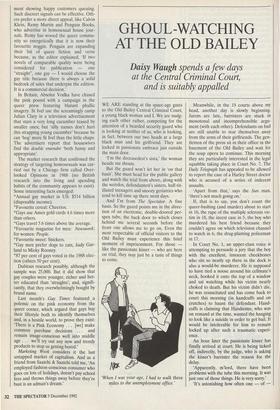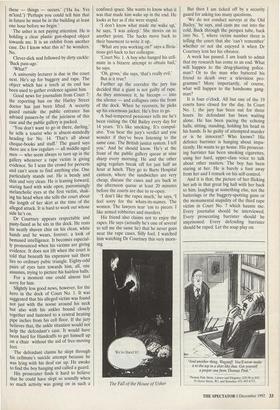GHOUL-WATCHING AT THE OLD BAILEY
Daisy Waugh spends a few days
at the Central Criminal Court, and is suitably appalled
WE ARE standing at the space-age gates to the Old Bailey Central Criminal Court, a young black woman and I. We are nudg- ing each other rather, competing for the attention of a bearded security guard who is looking at neither of us, who is looking, in fact, between our two heads at a large black man and his girlfriend. They are locked in passionate embrace just outside the main door.
'I'm the deceasedest's sista,' the woman beside me shouts.
But the guard won't let her in 'on that basis'. She must head for the public gallery and watch the trial from above, along with the weirdos, defendantest's sisters, half-tit- illated teenagers and snoozy geriatrics who tend to kill time up there most days.
And I'm from The Spectator. A fine basis. So the guard points me in the direc- tion of an electronic, double-doored per- spex tube, the back door to which closes behind me several seconds before the front one allows me to go on. Even the most respectable of official visitors to the Old Bailey must experience this brief moment of imprisonment. For those — like the passionate kisser — who are here on trial, they may just be a taste of things to come.
'When I was your age, I had to walk three miles to the unemployment office.' Meanwhile, in the 19 courts above my head, another day is slowly beginning. Jurors are late, barristers are stuck in monotonal and incomprehensible argu- ment (with each other). Defendants on bail are still unable to tear themselves away from the arms of their girlfriends. The gen- tlemen of the press sit in their office- in the basement of the Old Bailey and wait for the soap opera to continue. This morning they are particularly interested in the legal squabble taking place in Court No. 7. The Daily Telegraph has appealed to be allowed to report the case of a Harley Street doctor who is accused of a series of indecent assaults.
'Apart from that,' says the Sun man, 'there's not much going on.'
If, that is to say, you don't count the queer-bashing (and murder) about to start in 16, the rape of the multiple sclerosis vic- tim in 18, the incest case in 5, the boy who murdered his best friend because they couldn't agree on which television channel to watch in 6, the drug-planting policeman in 17.
In Court No. 1, an upper-class voice is attempting to persuade a jury that the boy with the excellent, innocent cheekbones who sits so neatly up there in the dock is also a would-be murderer. He is supposed to have tied a noose around his cellmate's neck, hooked it onto the top of a window and sat watching while his victim nearly choked to death. But his victim didn't die, he was resuscitated and has come back to court this morning (in handcuffs and on crutches) to haunt the defendant. Hand- cuffs is claiming that Handsome, who was on remand at the time, wanted the hanging to look like a suicide in order to get bail. It would be intolerable for him to remain locked up after such a traumatic experi- ence.
An hour later the passionate kisser has finally arrived at court. He is being ticked off, indirectly, by the judge, who is asking the kisser's barrister the reason for the delay.
'Apparently, mlord, there have been problems with the tube this morning. It was just one of those things. He is very sorry.'
'It's astonishing how often one — of — these — things — occurs.' ('Ha ha. Yes nflord.') 'Perhaps you could tell him that in future he must be in the building at least one hour before we begin.'
The usher is not paying attention. He is holding a clear plastic gun-shaped object towards me. It is an exhibit from another case. Do I know what this is? he wonders. No.
Clever-dick nod followed by dirty cackle: 'Back pass-age.'
What?'
A university lecturer is due in the court next. He's up for buggery and rape. The object which has a torch at its end has been used to gather evidence against him. Good news for journalists from Court 7: the reporting ban on the Harley Street doctor has just been lifted. A security guard outside the public entrance has advised passers-by of the juiciness of this case and the public gallery is packed. 'You don't want to go in there, darling,' he tells a tourist who is absent-mindedly heading for No. 14. 'That's all about cheque-books and stuff.' The guard says there are a few regulars — all middle-aged men — who seem always to turn up in the gallery whenever a rape victim is giving evidence. So I scan the crowd for perverts and can't seem to find anything else. One particularly stands out. He is bendy and thin and very clean. He is leaning forward, staring hard with wide open, patronisingly melancholic eyes at the first victim, shak- ing his head when she tells the court about the length of her skirt at the time of the alleged attack. It is hard to work out whose side he's on.
Dr Courtney appears respectable and pasty-faced as he sits in the dock. He rests his neatly shaven chin on his clean, white hands and he wears, forever, a look of bemused intelligence. It becomes especial- ly pronounced when his victims are giving evidence. It does not lift when the court is told that beneath his expensive suit there lies no ordinary pubic triangle. Eighty-odd pairs of eyes turn towards him, all, one assumes, trying to picture his hairless balls. For a moment one could almost feel sorry for him. Slightly less good news, however, for the hero in the dock of Court No. 1. It was suggested that his alleged victim was found not just with the noose around his neck but also with his ankles bound closely together and fastened to a central heating pipe inches from his cell floor. If the jury believes that, the ankle situation would not help the defendant's case. It would have been hard for Handcuffs to get himself up on a chair without the aid of free-moving feet.
The defendant claims he slept through his cellmate's suicide attempt because he was lying with his deaf ear up. He awoke to find the boy hanging and called a guard. His prosecuter finds it hard to believe that he could have slept so soundly when so much activity was going on in such a confined space. She wants to know what it was that made him wake up in the end. He looks at her as if she were stupid.
'I don't know what made me wake up,' he says, 'I was asleep.' She moves on to another point. The hacks move back to their basement to write it up.
'What are you working on?' says a flirta- tious girl-hack to her colleague.
'Court No. 1. A boy who hanged his cell- mate in a bizarre attempt to obtain bail,' he says.
'Oh, gross,' she says, 'that's really evil.' But is it true?
Further up the corridor the jury has decided that a giant is not guilty of rape. As they announce it, he hiccups — into the silence — and collapses onto the front of the dock. When he recovers, he picks up his enormous jacket. He's free to go.
A bad-tempered pensioner tells me he's been visiting the Old Bailey every day for 14 years. 'It's like smoking. It's compul- sive. You hear the jury's verdict and you wonder if they've been listening to the same case. The British justice system. I tell you.' And he should know. He's at the front of the public gallery queue at nine sharp every morning. He and the other aging regulars break off for just half an hour at lunch. They go to Barts Hospital canteen, where the sandwiches are very cheap, discuss the cases and are back in the afternoon queue at least 20 minutes before the courts are due to re-open.
'I don't like the rapes much,' he says, 'I feel sorry for the whats-its-names. The women. The lawyers tear 'em to pieces. I like armed robberies and murders.'
His friend also claims not to enjoy the rapes. He says (actually he's one of several to tell me the same lie) that he never goes near the rape cases. Silly fool. I watched him watching Dr Courtney this very morn- ing.
The Fall of the House of Usher But then I am ticked off by a security guard for asking too many questions.
'We do not conduct surveys at the Old Bailey,' he says, and casts me out into the cold. Back through the perspex tube, back into No. 7, where victim number three is telling the court that she 'can't remember' whether or not she enjoyed it when Dr Courtney lent her his vibrator.
A week has passed. I am loath to admit that my research has come to an end. What will happen to the drug-planting police- man? Or to the man who battered his friend to death over a television pro- gramme? More importantly, of course, what will happen to the handsome gang- man?
It is four o'clock. All but one of the 19 courts have closed for the day. In Court No. 1, the jury has been out for three hours. Its defendant has been waiting alone. He has been pacing the echoing halls, sitting, standing, holding his head in his hands. Is he guilty of attempted murder or is he innocent? Who knows? His defence barrister is hanging about impa- tiently. He wants to go home. His prosecut- ing barrister has been smoking cigarettes, using her hard, upper-class voice to talk about other matters. The boy has been staring at her. He is barely a foot away from her and I remark on his self-control.
And it is that, the picture of her flicking her ash in that great big hall with her back to him, laughing at something else, not the batterings or the buggery-spotting guns or the monumental stupidity of the third rape victim in Court No. 7 which haunts me. Every journalist should be interviewed. Every prosecuting barrister should be imprisoned. Every defending barrister should be raped. Let the soap play on.











































































 Previous page
Previous page